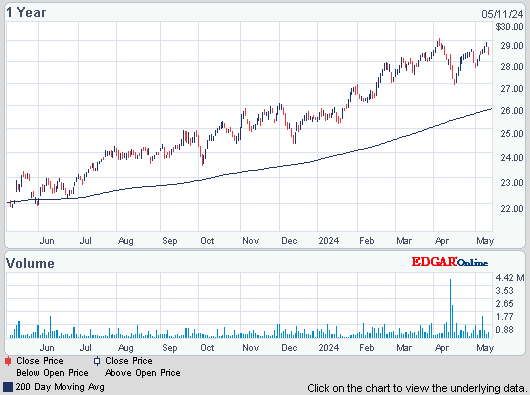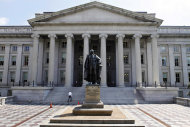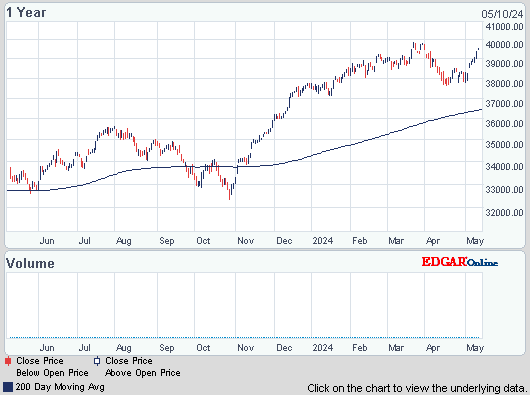Dow crawled up 8, advancers barely ahead of decliners & NAZ went up 6. The MLP index slipped fractionally to the 455s & the REIT index fell 2+ to the 274s. Junk bond funds were mixed & Treasuries hardly budged. Oil fell
for the 6th time in 7 days as Japan's economy slowed in Q2 & the dollar strengthened. Gold rose to the highest level in 2 months.
AMJ (Alerian MLP Index tracking fund)


Photo: Yahoo
The federal gov is on track to record a significant drop in its deficit this year with stronger growth helping to boost tax revenues. The Congressional Budget Office (CBO) estimates that the deficit for Jul will total $96B, bringing the total for the first 10 months of the budget year to $606B, $368B below the same period in 2011. Thru Jun, the deficit totaled $509B, an improvement of 43.6% from the same period a year ago & kept the country on track to post the first deficit below $1T in 5 years. The CBO is forecasting that the annual deficit will be $670B when the budget year ends on Sep 30. That is well below last year's deficit of $1.09T. While it would still be the 5th largest deficit in history, it would be the lowest since 2009. Steady economic growth & higher tax rates have boosted tax revenue this year. At the same time, spending has fallen, reflecting the winding down of the Iraq & Afghanistan wars & lower spending on such programs as unemployment benefits because of an improving economy. The budget outlook also looks better because of large div payments it is receiving from Fannie Mae & Freddie. Fannie said last week that it would pay a div of $10B next month & made no request for additional federal aid. Each deficit contributes to the national debt, currently at $16.7T. When Congress returns in Sep, it will face the need to boost the current borrowing limit & approve a budget for the new budget year beginning on Oct 1. However, Reps & Dem still remain at odds over that legislation.

Photo: Bloomberg
The euro-area economy probably edged back to growth in Q2 for the first time since 2011, ending the longest recession since the € started 14 years ago. GDP in the 17-nation region is forecasted to expand 0.2% in Q2 after shrinking for the previous 6 qtrs. Germany probably grew about 0.75%, according to a gov estimate, exceeding the 0.6% previously predicted. A year of relative calm on financial markets, budget cuts from Spain & Italy & growth in the US have helped the euro area start to recover. While the overall outlook has improved, the recession has left the region with a youth unemployment rate of 24%, & parts of southern Europe remain mired in a slump. Mario Draghi has described progress as “tentative.” Against that backdrop, the ECB has cut interest rates to their lowest levels & Draghi has pledged they’ll stay there or lower for an “extended period.” Spain’s economy shrank just 0.1% in Q2 from Q1. But its youth unemployment is 56%. In Italy, where the Prime Minister is easing last year’s budget austerity, GDP fell a less-than-forecast 0.2%.
Euro Area’s Recession Seen Over as Champagne Kept on Ice

Photo: Bloomberg
Japan's economy slowed more than forecast in Q2 as businesses cut investment, undermining gains in consumer & gov spending that helped reduce deflationary pressures. GDP rose an annualized 2.6% from Q1, when it climbed 3.8%, the Cabinet Office reported. The forecast called for a 3.6% gain. Unadjusted for price changes, nominal GDP growth accelerated to 2.9%. The report adds to the debate on whether Japan will be strong enough to sustain a planned 3% point bump in the sales tax in Apr. Prime Minister Shinzo Abe will decide in coming months on whether to proceed. While consumers continue to propel Japan’s rebound, companies have yet to commit to the Abenomics project, paring capital spending, for a 6th straight qtr.
Japan’s Economy Slows as Companies Cut Spending Even With Deflation Easing
The weekend was extended by traders, with little going on in the stock market. This is Aug & generally there is little news to inspire buyers or sellers. But high yield sectors continue to be well of their highs made earlier this year, a negative sign for the markets.
Dow Jones Industrials

AMJ (Alerian MLP Index tracking fund)
Treasury yields:
U.S. 3-month |
0.05% | |
U.S. 2-year |
0.30% | |
U.S. 10-year |
2.56% |
| CLU13.NYM | ...Crude Oil Sep 13 | ...105.56 | (0.4%) |
| GCQ13.CMX | ...Gold Aug 13 | ......1,336.00 | (1.8%) |

Photo: Yahoo
The federal gov is on track to record a significant drop in its deficit this year with stronger growth helping to boost tax revenues. The Congressional Budget Office (CBO) estimates that the deficit for Jul will total $96B, bringing the total for the first 10 months of the budget year to $606B, $368B below the same period in 2011. Thru Jun, the deficit totaled $509B, an improvement of 43.6% from the same period a year ago & kept the country on track to post the first deficit below $1T in 5 years. The CBO is forecasting that the annual deficit will be $670B when the budget year ends on Sep 30. That is well below last year's deficit of $1.09T. While it would still be the 5th largest deficit in history, it would be the lowest since 2009. Steady economic growth & higher tax rates have boosted tax revenue this year. At the same time, spending has fallen, reflecting the winding down of the Iraq & Afghanistan wars & lower spending on such programs as unemployment benefits because of an improving economy. The budget outlook also looks better because of large div payments it is receiving from Fannie Mae & Freddie. Fannie said last week that it would pay a div of $10B next month & made no request for additional federal aid. Each deficit contributes to the national debt, currently at $16.7T. When Congress returns in Sep, it will face the need to boost the current borrowing limit & approve a budget for the new budget year beginning on Oct 1. However, Reps & Dem still remain at odds over that legislation.
- U.S. Budget Deficit on Track for Drop Associated Press

Photo: Bloomberg
The euro-area economy probably edged back to growth in Q2 for the first time since 2011, ending the longest recession since the € started 14 years ago. GDP in the 17-nation region is forecasted to expand 0.2% in Q2 after shrinking for the previous 6 qtrs. Germany probably grew about 0.75%, according to a gov estimate, exceeding the 0.6% previously predicted. A year of relative calm on financial markets, budget cuts from Spain & Italy & growth in the US have helped the euro area start to recover. While the overall outlook has improved, the recession has left the region with a youth unemployment rate of 24%, & parts of southern Europe remain mired in a slump. Mario Draghi has described progress as “tentative.” Against that backdrop, the ECB has cut interest rates to their lowest levels & Draghi has pledged they’ll stay there or lower for an “extended period.” Spain’s economy shrank just 0.1% in Q2 from Q1. But its youth unemployment is 56%. In Italy, where the Prime Minister is easing last year’s budget austerity, GDP fell a less-than-forecast 0.2%.
Euro Area’s Recession Seen Over as Champagne Kept on Ice

Photo: Bloomberg
Japan's economy slowed more than forecast in Q2 as businesses cut investment, undermining gains in consumer & gov spending that helped reduce deflationary pressures. GDP rose an annualized 2.6% from Q1, when it climbed 3.8%, the Cabinet Office reported. The forecast called for a 3.6% gain. Unadjusted for price changes, nominal GDP growth accelerated to 2.9%. The report adds to the debate on whether Japan will be strong enough to sustain a planned 3% point bump in the sales tax in Apr. Prime Minister Shinzo Abe will decide in coming months on whether to proceed. While consumers continue to propel Japan’s rebound, companies have yet to commit to the Abenomics project, paring capital spending, for a 6th straight qtr.
Japan’s Economy Slows as Companies Cut Spending Even With Deflation Easing
The weekend was extended by traders, with little going on in the stock market. This is Aug & generally there is little news to inspire buyers or sellers. But high yield sectors continue to be well of their highs made earlier this year, a negative sign for the markets.
Dow Jones Industrials










No comments:
Post a Comment